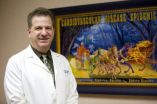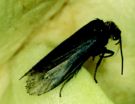(Press-News.org) New findings by civil engineering researchers in the University of Minnesota's College of Science and Engineering shows that treating municipal wastewater solids at higher temperatures may be an effective tool in the fight against antibiotic-resistant bacteria.
Heating the solid waste to 130 degrees Fahrenheit (55 degrees Celsius) was particularly effective in eliminating the genes that confer antibiotic resistance. These genes are used by bacteria to become resistant to multiple antibiotics, which are then known as "superbacteria" or "superbugs."
The research paper was recently published in Environmental Science & Technology, a journal of the American Chemical Society and highlighted in the society's weekly magazine Chemical & Engineering News.
Antibiotics are used to treat numerous bacterial infections, but the ever-increasing presence of antibiotic-resistant bacteria has raised substantial concern about the future effectiveness of antibiotics.
"The current scientific paradigm is that antibiotic resistance is primarily caused by antibiotic use, which has led to initiatives to restrict antibiotic prescriptions and curtail antibiotic use in agriculture," said civil engineering associate professor Timothy LaPara, an expert in both wastewater treatment and microbiology who led the new University of Minnesota study. "Our research is one of the first studies that considers a different approach to thwarting the spread of antibiotic resistance by looking at the treatment of municipal wastewater solids."
Antibiotic resistant bacteria develop in the gastrointestinal tracts of people taking antibiotics. These bacteria are then shed during defecation, which is collected by the existing sewer infrastructure and passed through a municipal wastewater treatment facility. The majority of wastewater treatment plants incubate the solid waste, called sludge, in a "digester" that decomposes organic materials. Digesters are often operated at 95 to 98 degrees Fahrenheit (35 to 37 degrees Celsius).
"Many digesters are operated at our body temperature, which is perfect for resistant bacteria to survive and maybe even grow," LaPara said.
Lab research by LaPara and his graduate student David Diehl shows that anaerobic digestion of municipal wastewater solids at high temperatures (as high as 130 degrees Fahrenheit or 55 degrees Celsius) is capable of destroying up to 99.9 percent of various genes that confer resistance in bacteria. In contrast, conventional anaerobic digestion (operated at 95 to 98 degrees Fahrenheit or about 37 degrees Celsius) demonstrated only a slight ability to eliminate the same set of genes.
"Our latest research suggests that high temperature anaerobic digestion offers a novel approach to slow the proliferation of antibiotic resistance." LaPara said. "This new method could be used in combination with other actions, like limiting the use of antibiotics, to extend the lifespan of these precious drugs."
LaPara also pointed out that raising the temperature of anaerobic digestion at wastewater treatment plants is not cost-prohibitive because the digesting bacteria produce methane gas that can be used to heat the reactor.
INFORMATION:
The Minnesota Environmental and Natural Resources Trust Fund financially supported LaPara's recent research. LaPara has secured a grant from the National Science Foundation to continue his research examining other technologies to eliminate antibiotic-resistant bacteria in wastewater solids.
To view the most recent research report published in Environmental Science & Technology, visit http://z.umn.edu/lapara.
University of Minnesota engineering researcher finds new way to fight antibiotic-resistant bacteria
Treating municipal wastewater solids at higher temperatures proves effective
2010-11-23
ELSE PRESS RELEASES FROM THIS DATE:
The not-so-sweet truth about sugar -- a risk choice?
2010-11-23
More and more people have become aware of the dangers of excessive fructose in diet. A new review on fructose in an upcoming issue of the Journal of the American Society of Nephrology (JASN) indicates just how dangerous this simple sugar may be.
Richard J. Johnson, MD and Takahiko Nakagawa, MD (Division of Renal Diseases and Hypertension, University of Colorado) provide a concise overview of recent clinical and experimental studies to understand how excessive amounts of fructose, present in added sugars, may play a role in high blood pressure, diabetes, obesity, and ...
Perceptual training improves vision of the elderly
2010-11-23
RIVERSIDE, Calif. – Elderly adults can improve their vision with perceptual training, according to a study from the University of California, Riverside and Boston University that has implications for the health and mobility of senior citizens.
The study, "Perceptual learning, aging, and improved visual performance in early stages of visual processing," appears in the current online issue of the Journal of Vision. It was funded by a $3.5 million grant from the National Institute on Aging.
UCR researchers G. John Andersen, professor of psychology; Rui Ni, formerly a postdoctoral ...
HIV drugs interfere with blood sugar, lead to insulin resistance
2010-11-23
The same powerful drugs that have extended the lives of countless people with HIV come with a price – insulin resistance that can lead to diabetes and cardiovascular disease.
Now, researchers at Washington University School of Medicine in St. Louis have determined why that happens. Their research shows that HIV protease inhibitors directly interfere with the way blood sugar levels are controlled in the body. This leads to insulin resistance, a condition that occurs when the body produces enough insulin but doesn't use it properly.
This confirmation provides the potential ...
Number of doctorates awarded continued to grow in 2009
2010-11-23
U.S. academic institutions awarded 49,562 research doctorate degrees in 2009, the highest number ever reported by the National Science Foundation's Survey of Earned Doctorates (SED), and a 1.6 percent increase over 2008's total of 48,802.
The SED is an annual census of all individuals who receive a research doctorate from a U.S. academic institution in an academic year, which is July 1 through June 30 of the following year. The 2009 census covered individuals who earned doctorates in the academic year ending June 2009. NSF's Science Resources Statistics division compiled ...
AGU highlights: Nov. 22, 2010
2010-11-23
The following highlights summarize research papers that have been recently published in Geophysical Research Letters (GRL), Water Resources Research (WRR), and Journal of Geophysical Research - Earth Surface (JGR-F).
In this release:
Changing winds can influence amounts of carbon dioxide the ocean holds
Large methane release from ocean sediments during glacial periods?
Magnetic island observed at Earth's magnetopause
Understanding particle movement improves models of stream erosion and deposition
New method for assessing uncertainty in groundwater models
...
Gene find could lead to healthier food, better biofuel production
2010-11-23
WEST LAFAYETTE, Ind. - Purdue University scientists have found the last undiscovered gene responsible for the production of the amino acid phenylalanine, a discovery that could lead to processes to control the amino acid to boost plants' nutritional values and produce better biofuel feedstocks.
Natalia Dudareva, a distinguished professor of horticulture, and Hiroshi Maeda, a postdoctoral researcher in Dudareva's laboratory, determined that the gene is one of 10 responsible for phenylalanine production in plants. Understanding how the amino acid is produced could provide ...
The puzzle of biological diversity
2010-11-23
Biologists have long thought that interactions between plants and pollinating insects hasten evolutionary changes and promote biological diversity. However, new findings show that some interactions between plants and pollinators are less likely to increase diversity than previously thought, and in some instances, reduce it.
Findings, published in the Journal of Evolutionary Biology, show that local populations of one of the most distinctive plants in the Mojave Desert, the Joshua tree, are not as biologically diverse as would be expected. Joshua trees cannot produce seeds ...
Upper-class people have trouble recognizing others' emotions
2010-11-23
Upper-class people have more educational opportunities, greater financial security, and better job prospects than people from lower social classes, but that doesn't mean they're more skilled at everything. A new study published in Psychological Science, a journal of the Association for Psychological Science, finds surprisingly, that lower-class people are better at reading the emotions of others.
The researchers were inspired by observing that, for lower-class people, success depends more on how much they can rely on other individuals. For example, if you can't afford ...
Study could mean greater anticipated global warming
2010-11-23
Current state-of-the-art global climate models predict substantial warming in response to increases in greenhouse gases such as carbon dioxide. The models, though, disagree widely in the magnitude of the warming we can expect. The disagreement among models is mainly due to the different representation of clouds. Some models predict that global mean cloud cover will increase in a warmer climate and the increased reflection of solar radiation will limit the predicted global warming. Other models predict reduced cloudiness and magnified warming. In a paper that has just appeared ...
Making stars: Studies show how cosmic dust and gas shape galaxy evolution
2010-11-23
Astronomers find cosmic dust annoying when it blocks their view of the heavens, but without it the universe would be devoid of stars. Cosmic dust is the indispensable ingredient for making stars and for understanding how primordial diffuse gas clouds assemble themselves into full-blown galaxies.
"Formation of galaxies is one of the biggest remaining questions in astrophysics," said Andrey Kravtsov, associate professor in astronomy & astrophysics at the University of Chicago.
Astrophysicists are moving closer to answering that question, thanks to a combination of new ...
LAST 30 PRESS RELEASES:
A kaleidoscope of cosmic collisions: the new catalogue of gravitational signals from LIGO, Virgo and KAGRA
New catalog more than doubles the number of gravitational-wave detections made by LIGO, Virgo, and KAGRA observatories
Antifibrotic drug shows promise for premature ovarian insufficiency
Altered copper metabolism is a crucial factor in inflammatory bone diseases
Real-time imaging of microplastics in the body improves understanding of health risks
Reconstructing the world’s ant diversity in 3D
UMD entomologist helps bring the world’s ant diversity to life in 3D imagery
ESA’s Mars orbiters watch solar superstorm hit the Red Planet
The secret lives of catalysts: How microscopic networks power reactions
Molecular ‘catapult’ fires electrons at the limits of physics
Researcher finds evidence supporting sucrose can help manage painful procedures in infants
New study identifies key factors supporting indigenous well-being
Bureaucracy Index 2026: Business sector hit hardest
ECMWF’s portable global forecasting model OpenIFS now available for all
Yale study challenges notion that aging means decline, finds many older adults improve over time
Korean researchers enable early detection of brain disorders with a single drop of saliva!
Swipe right, but safer
Duke-NUS scientists identify more effective way to detect poultry viruses in live markets
Low-intensity treadmill exercise preconditioning mitigates post-stroke injury in mouse models
How moss helped solve a grave-robbing mystery
How much sleep do teens get? Six-seven hours.
Patients regain weight rapidly after stopping weight loss drugs – but still keep off a quarter of weight lost
GLP-1 diabetes drugs linked to reduced risk of addiction and substance-related death
Councils face industry legal threats for campaigns warning against wood burning stoves
GLP-1 medications get at the heart of addiction: study
Global trauma study highlights shared learning as interest in whole blood resurges
Almost a third of Gen Z men agree a wife should obey her husband
Trapping light on thermal photodetectors shatters speed records
New review highlights the future of tubular solid oxide fuel cells for clean energy systems
Pig farm ammonia pollution may indirectly accelerate climate warming, new study finds
[Press-News.org] University of Minnesota engineering researcher finds new way to fight antibiotic-resistant bacteriaTreating municipal wastewater solids at higher temperatures proves effective



